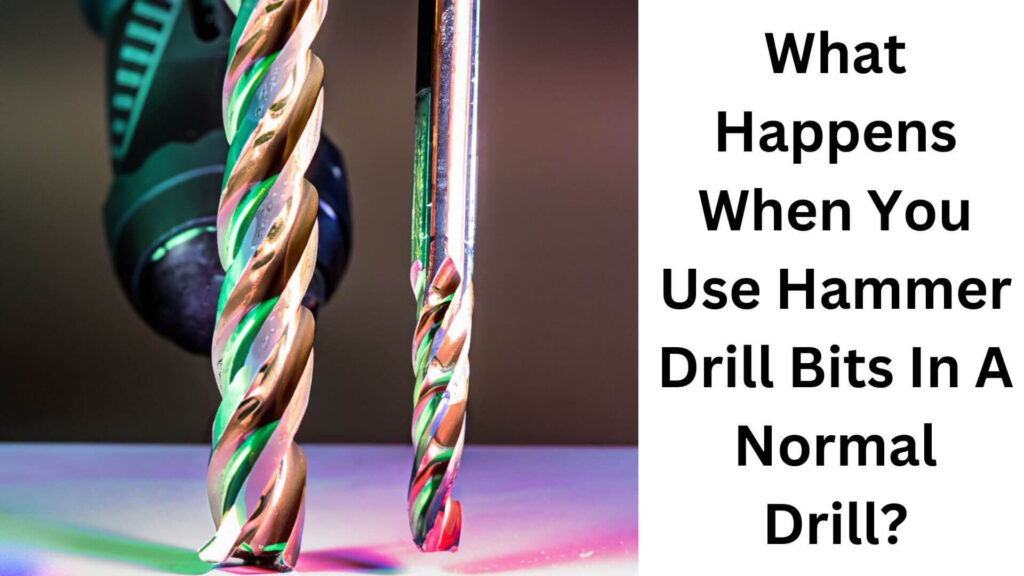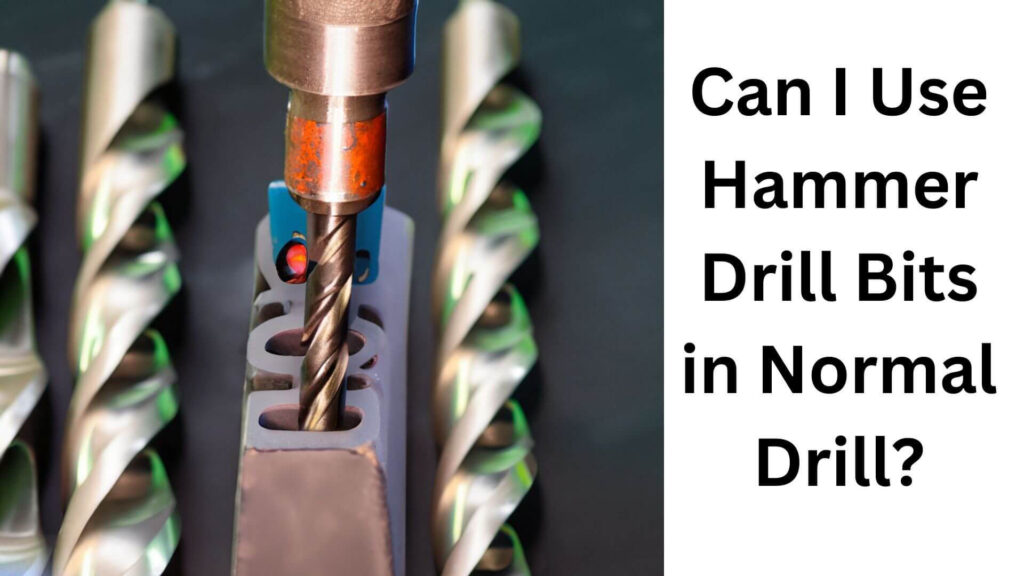If you’ve found yourself wondering whether hammer drill bits can be used in a regular drill, you’re not alone. Many people face the same dilemma when it comes to choosing the right tools for their DIY projects. While hammer drill bits are designed for use in more robust environments like masonry, it can be tempting to use them in a standard drill.
In this blog post, we will explore the differences between hammer drill bits and normal drill bits, examine if and when you can use hammer drill bits in regular drills, and provide useful tips to help you avoid damage to your tools.
Table of Contents
Understanding The Differences Between Hammer Drill Bits And Normal Drill Bits
Before deciding if hammer drill bits can be used in a regular drill, it’s crucial to understand the differences between the two types of bits. Although both can technically be used for drilling, they are designed for very different purposes and materials.
Explanation Of The Design And Function Of Hammer Drill Bits And Normal Drill Bits
Hammer Drill Bits: Hammer drill bits are designed for use with hammer drills, which deliver a percussive hammering action combined with the rotational motion of the bit. The bits are typically carbide-tipped, which makes them strong enough to penetrate tough materials like concrete, brick, and stone. These bits are built to withstand the impact force of a hammer drill and have specialized flute designs that help remove dust and debris as they cut through the masonry.
Normal Drill Bits: Standard drill bits are generally intended for use with regular drills that provide only rotational force. These bits are often made of high-speed steel (HSS) or carbon steel and are designed to handle softer materials like wood, metal, and plastic. Regular drill bits come in various shapes and sizes, depending on the material being drilled, but they lack the durability needed to withstand the impact forces of masonry work.
Comparison Of The Differences Between The Two Types Of Bits In Terms Of Materials Used, And Sizes Available
Materials:
- Hammer Drill Bits: Typically have carbide tips, which are much harder and more durable than standard steel tips, allowing them to drill into concrete, brick, and other masonry surfaces.
- Normal Drill Bits: Made from high-speed steel, cobalt, or titanium-coated steel, normal drill bits are not as hard as carbide and are mainly used for softer materials.
Sizes:
- Hammer Drill Bits: Hammer drill bits are usually available in larger diameters and longer lengths to accommodate the needs of masonry work. They range in size from small diameters (for drilling anchors into concrete) to large diameters for heavy-duty masonry work.
- Normal Drill Bits: Normal drill bits come in a wide range of sizes, usually in shorter lengths, making them more versatile for various tasks like woodwork, metal drilling, or plastic cutting.
Identification Of The Benefits Of Using Each Type Of Bit
Hammer Drill Bits:
- Ideal for drilling into hard surfaces like brick, concrete, and stone.
- Highly durable and resistant to wear.
- Designed to handle the percussive forces of a hammer drill.
Normal Drill Bits:
Available in a wider variety of shapes and sizes for different applications.
Perfect for softer materials like wood, plastic, and metal.
More versatile for day-to-day drilling tasks.
Read More: Are Hammer Drill Bits Different?
Do You Use Hammer Drill Bits In Normal Drills?
The answer to whether you can use hammer drill bits in a regular drill is not a simple yes or no. It largely depends on the task at hand, the materials being drilled, and the limitations of your tools.
1. Explanation Of Why Or Why Not Hammer Drill Bits Can Be Used In Normal Drills
Hammer drill bits can technically be inserted into a regular drill’s chuck and used. However, a regular drill lacks the hammering action necessary to make these bits effective in their intended use, which is drilling into hard materials like concrete or brick. Hammer drill bits are designed to work in tandem with the percussive force of a hammer drill, and without that, they may struggle to perform as intended.
A regular drill won’t provide the impact force required to cut into tough materials, so while the bit might rotate and attempt to penetrate the surface, it will be slower and less effective.
2. Highlighting The Conditions Under Which This May Be Possible
There are specific scenarios where using a hammer drill bit in a regular drill may work:
- Drilling Into Soft Masonry: If you are drilling into soft brick or relatively soft concrete, you might be able to use a hammer drill bit in a regular drill. The key is to apply gentle pressure and patience since the regular drill won’t have the same impact force as a hammer drill.
- Light Masonry Work: For small or shallow holes in masonry, a hammer drill bit in a regular drill could suffice, though it will be far less efficient than using the proper tool.
3. Identify The Limitations, Risks, And Alternatives To Using Hammer Drill Bits In Normal Drills
Limited Effectiveness: As mentioned, regular drills lack the hammering force necessary to make hammer drill bits work efficiently in tough materials.
Overheating: Regular drills may overheat when used with hammer drill bits on masonry, as the motor has to work much harder without the assistance of the hammering action.
Drill Damage: Using hammer drill bits in a regular drill can wear out the motor faster, as it isn’t designed to handle the additional strain.
Bit Damage: Hammer drill bits can become dull faster when used improperly, as they are meant to handle impact force and not just rotation.
Alternatives: If you need to drill into concrete or brick, it’s best to invest in a hammer drill. Alternatively, consider using masonry drill bits in a regular drill if the material is soft enough to be penetrated without the need for impact.
What Happens When You Use Hammer Drill Bits In A Normal Drill?
Using hammer drill bits in a regular drill can lead to various consequences, including damage to the bit, the drill, or even the material you’re working on.

1. Explanation Of The Potential Dangers And Consequences Of Using Hammer Drill Bits In A Normal Drill
Inefficient Drilling: You’ll likely experience slower drilling speeds and reduced effectiveness, especially in tough materials like concrete.
Motor Overload: The drill’s motor may overheat due to the added strain of trying to drive the bit into hard surfaces without the hammering action.
Bit Damage: Without the percussive force, hammer drill bits can become worn or damaged faster when used improperly.
2. The Impact Of Misuse Or Abuse On The Bits And Drill
Regular drills are not built to withstand the forces required to break through masonry effectively. Prolonged misuse of hammer drill bits in regular drills can:
- Cause the drill to overheat or even burn out.
- Reduce the lifespan of the bit due to the lack of proper impact force.
- Lead to misaligned holes or unintended damage to the material being drilled.
Ways To Mitigate These Risks
Use The Right Tool For The Job: Whenever possible, use a hammer drill with hammer drill bits for masonry work.
Apply Light Pressure: If you must use a hammer drill bit in a regular drill, apply light, steady pressure to avoid overheating.
Pause Often: Allow the drill and the bit to cool down by taking frequent breaks during drilling.
Read More: When Should You Use a Hammer Drill?
Tips For Using Hammer Drill Bits In A Normal Drill
If you decide to use hammer drill bits in a normal drill, here are some tips to do so safely:
Proper Maintenance: Keep your drill bits clean and sharp. Dull bits will make drilling even more difficult and increase the risk of damage.
Use a Pilot Hole: Start with a smaller drill bit to create a pilot hole. This will make it easier for the hammer drill bit to penetrate the material.
Lower Speed Settings: Keep the drill at a low speed to prevent overheating and minimize wear on the motor and the bit.
Cooling Breaks: Take breaks to let the drill cool down, especially when working with harder materials like masonry.
Tips On How To Increase The Lifespan Of Hammer Drill Bits And Drills
Keep Bits Sharp: Regularly sharpen hammer drill bits or replace them when they become dull.
Use Lubricants: Apply lubricants to reduce friction and heat buildup during drilling, which helps prolong both the bit and drill’s life.
Proper Storage: Store your bits in a dry, clean environment to prevent rust or other forms of damage.
Avoid Overheating: Always drill in short intervals and avoid pushing the drill to its limits.
Frequently Asked Questions For Can I Use Hammer Drill Bits In Normal Drill
- Can I use masonry bits in a regular drill?
- Yes, masonry bits can be used in a regular drill for lighter masonry work, but they will be less effective than in a hammer drill.
- Can I drill into concrete with a regular drill?
- You can drill into softer concrete with a regular drill using a masonry bit, but for harder concrete, a hammer drill is recommended.
- What happens if I use a hammer drill bit in wood?
- Hammer drill bits are not designed for wood and can cause splintering or other damage. Use wood-specific bits instead.
Last Verdict
While it is technically possible to use hammer drill bits in a regular drill, the results are often suboptimal. Hammer drill bits are specifically designed to work with the percussive action of a hammer drill, and without that impact force, you risk damaging your drill, the bit, or the material you’re working on. It’s always best to use the right tool for the job. If you regularly work with masonry, investing in a hammer drill will save you time and frustration in the long run.

Hey, I am MD Hrithik Hossain, I’m a huge fan of DIY crafts. My workshop is where I spend most of my spare time, and I’m always working on some project. To that end, I’d like to share some of my knowledge and experience with you in power tools, woodworking, and other specialized materials fabrication.
I will guide you with genuine knowledge that can assist you with deciding whether a drill is appropriate according to your requirements or not. If you want to find the best drill and know which type of drill is most suited for your needs, then I can guide you with my expertise. My passion lies in helping others find the correct products they need at an affordable price.


